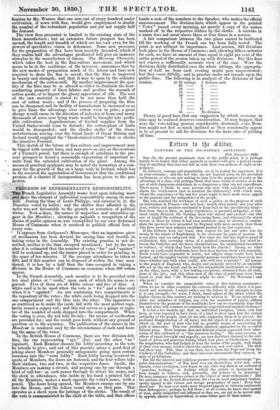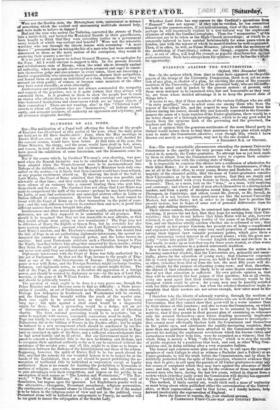rttr to 4t Cahn.
DANGERS OF THE NO-POPERY AGITATION.
27th November 1860.
Sin—In the present passionate state of the public mind, it is perhaps hardly to be hoped that either journals or readers will give a patient recep- tion to anything that does not fall in -with their own notions of right or ex- pediency.
If however, courage and impartiality are to be looked for anywhere, it is in your columns' and the few who are not hurried away by the prevalent excitement, or who are not seeking to turn it to the purposes of party or the advantage of a class, will perhaps think that sonic words of caution as to the use of such dangerous stimulants in so dangerous a time are not superfluous. There must, I think, be some persons who view with solicitude and even alarm the recklessness (not to mention the dishonesty) with which men, whom the experience of the last few years ought to have made wiser, appeal to the passions and the antipathies of the people.
One who.swatched the workings of such a policy or the progress of such an infatuation in France—who saw how, month after month, and year after year, writers and speakers continued to heap fuel on the smouldering heap— how from time to time, as party expediency, or personal antipathy, or irri- tated vanity dictated, the burning mass was stirred and excited—one who saw at length the outburst of the devouring flame, and witnessed the abject terrors of those by whom it had been nurtured—may be allowed to contem- plate the spectacle now presented by England with more anxiety than those who have never seen popular excitement pushed to its last expression.
It has hitherto been our boast, that respect for law and order was too strong in the minds of Englishmen to be overcome by gusts of passion. It is our glory and our safeguard still. For what else but this highest proof of civilization, this crowning virtue of a political community, has stood be- tween the Catholics and the fierce denunciations, the undisguised incentives to violence, of which they have lately been the objects ? Among no other people on earth could firebrands have been thus thrown about with impunity. Deeds would have responded to words; not effigies alone would have been burned, and the mighty torrent of popular passions would have been set in mo- tion—whither and with what result, who will dare to predict? All honour to the people of England, who, deeply and earnestly moved by an unjustifi- able act on the one hand, and by no less unjustifiable incitements to revenge on the other, have, with a few trifling exceptions abstained from all viola- tions of the law and this when men of the chills of gentlemen have been heard to wish that "Dr. Wiseman might be shot." Dr. Wiseman ? and who next ?
When we consider the unspeakable value of this tutelary sentiment— when we see in other countries the extreme difficulty with which it is pro- duced and nurtured, I might rather say the failure of all attempts to raise it to any strength—we must, I think, stand aghast at the efforts which the higher classes in this country are making to weaken it. If our ministers of state, our ministers of religion, nay even our ministers of justice, address themselves to the passions of the multitude, how can we reasonably hope that law and order will continue to command its respectful and implicit obedience?
It is but a few titonths ago that an individual foreigner, whose acts had been, or were reported to have been, of a kind to draw upon him the violent antipathy of the people, (and, let me add, supposing them to be proved, the profound disapprobation of all men,) was the object of a sudden and savage attack on the part of men who had no possible means of ascertaining his guilt or innocence. This was justified, admired, applauded by the so-called Liberal press. Even humane men and delicate women expressed their admi- ration of this outburst of a "fine generous feeling." The same persons, or others of equal foresight and sagacity, are now doubtless charmed at the out- burst of pious and generous feeling which took place at Cheltenham; where the magistrates, who had helped to heat the brains of the people took fright at their own success, tried to check the explosion, and were defied. The mob had their way. This that it was their cue to burn the Pope and break the windows of the Catholics; and these innocent amusements they enjoyed, in spite of prohibitions. But did the discreet and judicious persons who advise and encourage "po- pular demonstrations" of this kind ever ask themselves, what not, what emeute, what revolution, ever began in any other way than in an outburst of "generous feelings," or feelings which the rioters or insurgents had been taught to believe, and, generally, did believe to be generous ? Do men announce atrocious crimes as the object of their enthusiasm ? Did the authors of the French Revolution, did even its most sanguinary leaders, openly appeal to the vicious and savage propensities of men ? Even they dared not. No man ever made more frequent appeals to virtuous sentiments than Robespierre; perhaps he felt them ; at all events, he knew that masses of men, easily misguided and inflamed as they are, are yet to be moved only by appeals, sincere or hypocritical, to some better part of their nature.
Were not the Gordon riots, the Birmingham 'riots, undertaken in defence of something which the excited and unreasoning multitude deemed holy, and were made to believe in danger?
Had not the men who sacked the Tuileries, converted the streets-of Paris into a battle-field, and burned the Municipal Guards in their guardhouses, been taught to think that-they were executing justice on a government every branch of which was corrupt and baneful'? Were not the miserable wretches who ran through the streets hoarse with screaming "A mort Guizot !" persuaded that in taking tlie life of a man who had been constantly denounced to them as the main author of the corruptiou, they would be rendering their country a service ?
It is no part of my purpose to defend General Haynau, or to apologize for the Pope. All I would venture to suggest is this. In the present feverish and revolutionary state of Europe, when the wind site-so strongly against all authority, when the people are everywhere prepared and eager to consti- tute themselves judge and executioner in every cause, those are incurring a fearful responsibility who stimulate their passions sharpen their antipathies, and hound them on against an individual or a dale, because the one may be accused (or even guilty) of crimes, or because some members of the other may have acted absurdly, or even criminally.
Aristocracies and priesthood' have not always commanded the sympathy and support of the populace, nor is it quite certain that they always will command them. Is it prudent in them to show the people how to crush an enemy who offends them, or how to cover with contempt and opprobrium time-honoured institutions and observances which are no longer objects of their veneration ? There are not wanting, alas! in this "Christian land" crowds to whom all religious rites are "mummeries," all bishops useless, costly, and arrogant usurpers, all authority an oppression and a tyranny, and



























 Previous page
Previous page